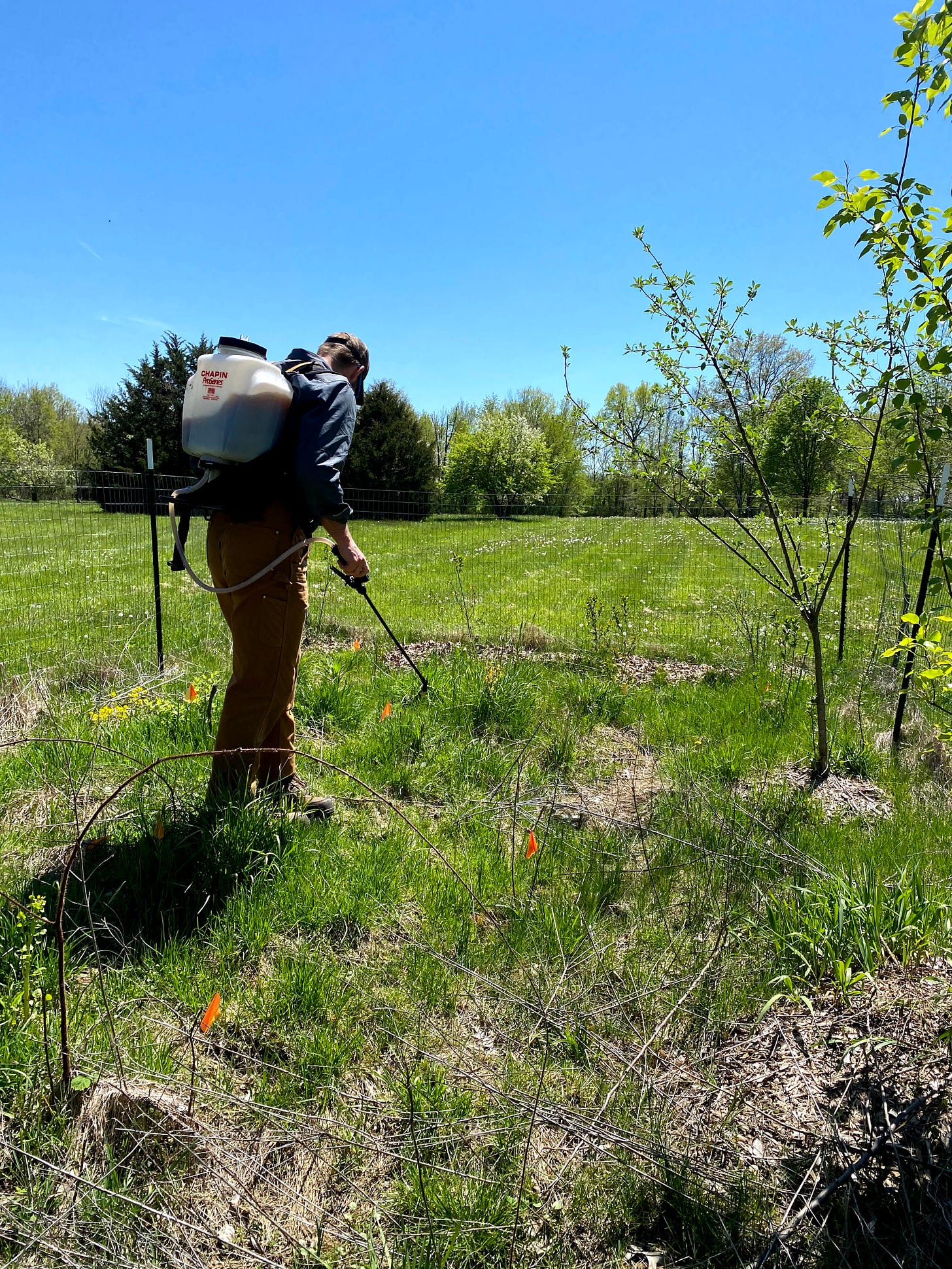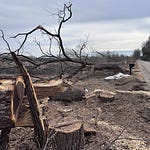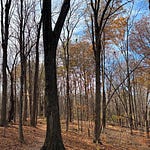This is the newsletter version of Sara by the Season, where I explore what is piquing my curiosity as I try to lean into nature’s wisdom and rhythms. You can listen to me read you the newsletter by hitting play above - or you can click the little link above and to the right to play in your favorite podcast player.
If you know someone who would like this sort of thing, I’d be so grateful if you would share it.

Grant started vermicomposting ten+ years ago, which if you aren’t familiar, is using worms to compost1. We figured out many years ago that expecting the worms to make actual compost for us required far too much work for our lazy ways, so now we just use them to make compost tea - usually in the spring and again in the fall if we aren’t too worn out from the growing season. The compost tea takes a few days to “brew,” and then Grant uses a sprayer to feed all of our trees and gardens with the finished tea, which is said to provide all sorts of benefits.
I learned a few years ago that the full moon in March in much of North America is called the worm moon, so I began thinking about this time around the spring equinox when all of Nature is waking up as compost season - because one of our first spring chores is making compost tea and because the earthworms are everywhere as the ground thaws. But also because it is a time to compost what has been, to think about what is worth carrying into Nature’s new year, what needs to be composted into something new.
When you compost, you have to be careful to have the proper ratio of green to brown materials. Green materials are food scraps, coffee grounds, and the like. Brown materials are things like leaves, shredded paper, and other dried living material. Composting experts (which we are definitely not) say that the ideal ratio of brown to green materials is two or three to one - meaning you need double or triple the amount of brown materials to green ones. But other than that, there aren’t a ton of rules around compost. If you leave it long enough, everything will eventually break down and it will be nourishing to your garden.
I think of this in-between time where spring has begun but the work of the garden hasn’t yet as a time to consider the compost pile. Fall is for letting go, and I love that season for what it is. But composting is different - it’s this intermingling of things that seemingly don’t have much use or would otherwise be thrown away that transform into something new that nourishes our plants, and by extension, us.
I personally and individually can use the compost pile as a model for this season. Contemplating what elements need to be mixed into my compost pile, so that I have something that is more lifegiving on the other side. It is a way of transcending and including as I go along. What we resist, persists, as we know, and the compost pile helps us avoid the resisting. Everything2 belongs in the compost pile - the bad habits, the old hangups, the way you can’t help but turn into the thirteen year-old version of yourself when you are back at your parent’s house, the specific way only you can nurture and love your children, the ways joy comes easily to you, the things that grab your attention. All of it belongs. The seemingly bad and good and everything in between. You dump it all in the compost heap, and trust that something life-giving will come out on the other side. It will look different than it did going in, and it might take awhile. But life will come out on the other side, just like after every winter - even the darkest, longest ones - spring comes.
I’ve been spending a good deal of time thinking about our collective need to transcend and include since November, and I am wondering if here too composting is a metaphor for how we could move forward. Postmodernity tells us that there is no such thing as universal truth, but, as Ken Wilbur rightfully points out, that statement in itself is an attempt at a universal truth, which puts the whole project on a very shaky foundation, of which we are now left trying to figure out what do about.
But the solution isn’t to throw out all of postmodernity - the solution must be to figure out what is worth salvaging, what needs to be transformed into something new, what could be thrown on the metaphorical compost pile to be rebirthed. Composting it all keeps us from resisting any part of it, from deconstructing without reconstructing, from swinging the pendulum too far in one direction.
What the Trump administration is doing right now is nowhere close to composting. The Trump administration is just burning it all down with little (no?) thought to reconstruction or consequences. And so there is both an individual and collective invitation for all of us during this compost season to practice composting instead - for inviting it all in.
In Internal Family Systems work, you think of yourself (and every human) as an ecosystem with different parts. Instead of saying, “I’m anxious,” IFS encourages you to identify the part of you that is anxious, to befriend and connect with it, and to engage with that part in a way that helps you to listen to what it is trying to tell you. I’m obviously way oversimplifying it here, but one of the big ahas for me in doing this work over the years, is that the point of IFS work isn’t to get the part to go away. The point (if you can even call it that) is for that anxious part of you (in this example) to step out of its protective role and reconnect to what IFS calls “Self,” which is very similar to religious concepts of soul, Holy Spirit, Atman, etc. The anxious part belongs, it’s just gotten a little out of control. It needs to know that it can ride on the bus of your life, but that it can’t sit in the driver seat, to steal an analogy of Elizabeth Gilbert’s.
This brings me back to the compost heap - everything belongs in the compost heap. The point of compost isn’t to be very judicious about what belongs and what doesn’t. You don’t sit around and weed out the stuff that is taking longer to compost and only leave the stuff that quickly decomposes - unless you want crappy compost. Composting isn’t efficient - time itself is the magic ingredient. It also resists any kind of perfection or calls for purity - it is a messy process with often messy results.
Compost gives us a map for this messy in-between time in which we find ourselves. Instead of resisting or denying those parts of our collective - and individual - shadows, what if we brought them out into the light, acknowledging them, wrestling with them, laying them down to be composted? What if we did so with less expectations around the end result, but something more like faith? What if we composted not in an effort for the shadows to go away, but in an effort for them to be transformed and rebirthed into something new, something lifegiving?
Or as Rilke says in far less words:
“Be patient toward all that is unsolved in your heart and try to love the questions themselves, like locked rooms and like books that are now written in a very foreign tongue. Do not now seek the answers, which cannot be given you because you would not be able to live them. And the point is, to live everything. Live the questions now. Perhaps you will then gradually, without noticing it, live along some distant day into the answer.”
― Rainer Maria Rilke
Scattering Seeds
I usually have stuff that I want to share that doesn’t fit in the main post + I’m always finding stuff that supports the thesis of the book I’m writing on the benefits of leaning into nature’s rhythms and wisdom, so I thought I could start sharing those links and things here with all of you in hopes of some of the seeds I share germinating into something beautiful at your place.
Vermi-composting. If you’re curious, we are still using this cheap process for our vermicompost, but it’s worth the click just for the pictures of baby Jasper - and Grant! If you really want the inside baseball, check out this video of Grant explaining how he makes the compost tea 😂I keep telling him to start a YouTube channel - don’t you agree?!
Theology of compost. Jeff Chu started this talk at the first Evolving Faith conference by saying “there are a hundred Sundays worth of sermons in the compost pile.” I loved hearing this originally in person, and I’m thankful they recorded it for posterity. If you liked that, you’ll enjoy this (written) sermon on the compost pile too.
Everything belongs. Of course, I stole this from Father Richie, and you should read this book if you haven’t.
Dualism and non-dualism. I’ve been chatting with a friend lately that somehow what is being required of us to move on from the shaky ground of post-modernity is an acceptance of both a non-dualistic way of thinking on some topics - and a dualistic way of thinking on others. We are dualistic about some things - like Nazism was bad; we are non-dualistic about many other things - like the numerous and diverse ways there are to connect with God/source/whatever name you want to give for that which is beyond yourself.
I listened to this conversation with
on The Wisdom & Action podcast (highly recommend btw), and he said something along the lines of postmodernity being a necessary deconstruction from modernity — but that it is no longer serving us, which sounded just like the conversation that my friend and I have been wrestling with.This trail led me to digging into some of Beiner’s writing, where I came across this that seems to fit into the composting work we are collectively being called into:
I completely messed up a quote by Iain McGilchrist. I ended up saying something along the lines of ‘what we need is not an either/or, or a yes/and perspective, but an either or and yes and’. And? [emphasis mine]
The point I was trying to make is that a theme I saw emerging in the group was that finding new ways to speak to each other about polarised topics will likely involve a bigger frame than we find in most of our cultural institutions. A frame that can hold the idea that sometimes the truth is relative, and sometimes it is fixed. Sometimes there is a right answer. Sometimes there isn’t, and sometimes both of those are true at once. Sometimes there’s a fixed, inescapable truth. Sometimes that truth is a culturally-conditioned lie.
Empathy alone won’t get us here. Connecting to the deeper emotional and spiritual truth of another doesn’t mean bypassing disagreement into a false sense of sameness. It means recognising, understanding and embodying their perspective and why they’re using the tactic they’re using, even if we disagree with it.
As I was writing this, I kept realizing that I keep circling around this same topic in different ways: mud season as an analogy for metamodernity, swinging the pendulum, maybe it’s not that deep. Not sure we even need another analogy to add to the group, but if, as Elie Wiesel says, “superficiality is the enemy of everything,” then at least I’m probing the depths of this topic!
Here’s to composting in the season ahead,
Sara
At the time, he kept the bins of worms in our basement, which was admittedly weird. Since we’ve lived at Funky Farms, he has kept them out in the garage, which seems less weird to me but still weird to others.
Professional composters will quible with this because there are things you shouldn’t put in your compost pile - mostly meat, dairy, and pet waste - but even that stuff, if left long enough, would break down.












Share this post